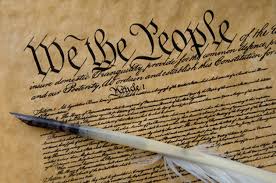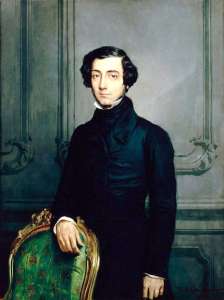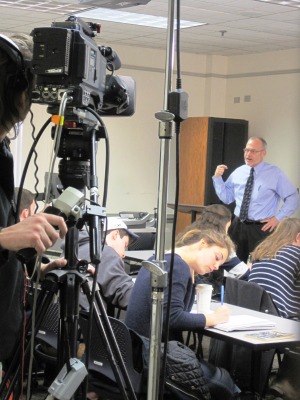“Think of your forefathers! Think of your posterity!”—John Quincy Adams

I have a hard time taking seriously Democratic appeals to the Constitution as they insist that Senate Republicans act promptly on President Obama’s nomination of Merrick Garland to the Supreme Court. Most Democrats long ago embraced a role for the Court that the Framers of the Constitution could have scarcely imagined. It seems more than a little opportunistic to rediscover the authority of original intent now that it suits their purposes. As I noted in a previous post, the Founders described the judicial branch in terms of its essential “feebleness.” The Court could never be a threat to the rights of the people, Alexander Hamilton insisted in Federalist no. 78, because under the Constitution the Court possessed “neither FORCE nor WILL but merely judgment.” The Framers would be stunned to see the power that the Court wields today.
And yet they would be equally mystified by Republicans who insist that public opinion should play an important role in shaping the composition of the Court. In arguing to postpone consideration of Obama nominee Merrick Garland, for example, Senate majority leader Mitch McConnell observes that “of course the American people should have a say in the Court’s direction.” That subterranean rumbling you may have noticed afterward came from the Founders collectively turning over in their graves.
The Framers’ vision for the proper place of public opinion in a free government is easy to caricature because it is complicated. In their reading of human nature, it was just as fallacious to assume “universal venality” (i.e., moral corruption) as to assume “universal rectitude,” to use Hamilton’s terminology. They believed that there was enough “honor and virtue among mankind” to justify an experiment in republican government grounded in the consent of the governed. But they also knew that there was enough “folly and wickedness” in human nature to make such a government perpetually susceptible to tyranny and injustice. And so they sought to ensure a degree of popular involvement in the new government while protecting it from undue popular pressure.
Remember how federal officeholders were originally to be selected: Only members of the House of Representatives would owe their appointment to the direct election of the people. According to James Madison in Federalist no. 52, this meant that the House, unique among the components of the new government, would have “an immediate dependence on, and an intimate sympathy with, the people.” But even then, “the people” who would so influence the Representatives comprised a severely truncated shell of today’s electorate. The Framers did not specify who should be eligible to vote, except to stipulate that the states should apply the same criteria for federal elections as they did for the houses of representatives in their own state legislatures. Based on state voting laws as they currently existed, the Framers could expect that members of the U. S. House of Representatives would be chosen by the votes of adult white male landowners. (Depending on the state, the property requirement for voting regularly disqualified from one-third to two-thirds of adult white males.)
So much for the government’s “popular branch.” The members of the more august Senate would be selected, not by the people directly, but by the state legislatures. To buffer the Senate further against popular pressures, only one-third of Senate seats would be open in any given election year. These features would make the Senate less susceptible to “the impulse of sudden and violent passions,” as Madison put it. More removed from “the people,” the upper chamber would function as an “anchor against popular fluctuations.” “I shall not scruple to add,” Madison further noted, that the Senate “may be sometimes necessary as a defense to the people against their own temporary errors and delusions.”
Less “popular” still would be the executive under the new Constitution. We sometimes forget that the Articles of Confederation didn’t include an executive branch at all, and so the Constitution’s framers were in uncharted territory as they sought to define the role of a “president” of the United States. Andrew Jackson would later redefine the office of president as the most uniquely democratic element of the federal government. This was true, he contended, because the president alone among all federal officeholders was chosen by the entire country.
But Jackson, keep in mind, made a practice of inverting the vision of the Framers while claiming to uphold it. In reality, the Framers went to great lengths to isolate the executive from popular pressure. They anticipated that, in most election years, the president would actually be chosen in a run-off in the House of Representatives where each state delegation would cast one vote. The congressmen would be choosing from among the five individuals who had received the most votes by “electors” from each state. (These are the members of our so-called electoral college. The Constitution does nothing to tie the selection of electors to the vote of the people, but leaves the manner of choosing them to each state legislature. For the next generation, at least, upwards of two-thirds were appointed by the state legislatures, not elected by “the people.”)
By protecting the executive from direct popular pressures, the Framers hoped that the executive would be able to perform his duties more effectively, always sensitive to the public welfare but never captive to the passions of the people. Alexander Hamilton developed the point at length in Federalist no. 71:
There are some who would be inclined to regard the servile pliancy of the executive to a prevailing current, either in the community or in the legislature, as its best recommendation. But such men entertain very crude notions, as well of the purposes for which government was instituted, as of the true means by which the public happiness may be promoted. The republican principle demands that the deliberate sense of the community should govern the conduct of those to whom they entrust the management of their affairs; but it does not require an unqualified complaisance to every sudden breeze of passion, or to every transient impulse which the people may receive.
Which brings us to the judicial branch. According to Mitch McConnell, it’s self-evident that “the American people should have a say in the Court’s direction.” He may be right. Given the inordinate power that the Court wields today, he probably is right. I would just like to hear this prominent conservative leader tell his constituents that none of the Framers whom he claims to venerate would agree with him.
Just think for a minute about how the Framers of the Constitution expected the members of the Supreme Court to be chosen: Supreme Court justices were to be appointed for life by the president of the United States, who in turn was to be elected by the House of Representatives, who would choose the president from a group of finalists identified by electors, who in turn were appointed by the state legislatures, who for their part were elected by adult, white, male, property-holding voters. Whatever you or I or Mitch McConnell may think, the Framers certainly didn’t believe that “the people” should “have a say in the Court’s direction.”
So what do we do with this information? I’m far from suggesting that we simply ask WWFD—What Would the Founders Do?—and then go and do likewise. Figures from the past have no authority over us, and figuring out what the Founders would think about contemporary politics settles nothing. But following John Quincy Adams, I think there’s more than a little wisdom in situating our contemporary debates within the larger conversations across time of which they are but a part. While we shouldn’t be slavishly submissive to the values of the Framers, neither should we be cavalierly dismissive. In Christian terms, the former is idolatry, the latter is arrogance. We avoid both these extremes when we assess their views critically but respectfully, grappling with them as we seek to clarify and justify our own positions.
The Framers’ determination to shield federal officeholders from undue popular pressure stemmed logically from a skeptical view of human nature that few twenty-first century Americans share. Nearly two centuries have passed since Alexis de Tocqueville noted wryly that the American people “live in the perpetual utterance of self-applause.” Most Americans—including most American Christians—now reflexively view human nature as essentially good and the wishes of the majority as essentially just. It might not be a bad thing if we reevaluated that popular prejudice in the light of Scripture.
But whatever your view of human nature, we might at least concede that there is a consistency and symmetry in the Framers’ efforts to shield the judiciary from popular opinion. In Federalist no. 52, James Madison explained the overall structure of the proposed government with reference to the maxim that “the greater the power is, the shorter ought to be its duration.” Because the House of Representatives would be Constitutionally charged with the responsibility of initiating all revenue measures, it was right and proper that representatives have the shortest terms of office and be most immediately responsive to “the people.” Terms of office would increase in length as the power of the office declined. Congressmen would serve for two years, presidents for four, senators for six . . . and Supreme Court justices for life.
That the Framers would allow such dramatically longer terms for Supreme Court justices makes sense only in light of their belief that the Court would exercise dramatically less influence on the life of the nation than it now does. If Mitch McConnell is right, and we now need to disregard the Framers’ goal of protecting the Court from public opinion, he is right because we have long since abandoned the Framers’ vision of a “feeble” judiciary with “neither FORCE nor WILL but merely judgment.”















